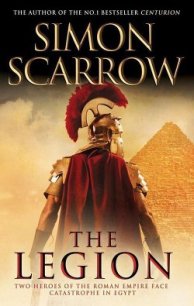The Forgotten Legion - Kane Ben (е книги .TXT) 📗
The alleys between paved streets remained as they had been since antiquity – covered with a mixture of mud and human waste. Far from main arteries into the centre, daily life here was a drudgery of using public fountains and toilets. Richer members of society living near larger ways were lucky enough to have household running water and sewage removal. Naturally Gemellus had both.
The note began to burn Romulus' hand as he walked. What did it say?
Why were armed men waiting outside the domus day and night? He thought of opening it, but there was little point. Romulus longed to read and write but like all the household slaves apart from Servilius, the merchant's bookkeeper, he was illiterate. Gemellus did not spend any money unless it yielded a profit. Romulus sighed. Perhaps he would learn something at his destination.
His evasive move had pushed him along the Via Ostiensis, which led between the Palatine and Caelian Hills to the Via Sacra. This made the journey much longer, and at the next intersection Romulus elected to take the shorter route along the Clivus Publicius. The Servian wall wove in and out of view as the road rose and fell. A massive defensive barrier, it had once enclosed many of the sprawling suburbs, but as the population in these vici swelled inexorably, the wall had ceased to define the city's perimeter. Buildings now extended far beyond its protection – on to the edge of the Campus Martius, the plain to the northwest, and the land north of the Quirinal Hill. With Rome's power over the peninsula of Italy absolute for more than a hundred years, few worried about the danger of attack.
At every crossroads stood members of the collegia, no longer just traders and artisans, but Clodius' men, armed and dangerous. Romulus knew better than to attract their attention and kept his gaze firmly on the rutted mud beneath his sandals. A few moments later, a funeral procession went past in the opposite direction, the family preceded by a public crier.
'This citizen, Marcus Scaurus, has been surrendered to death,' the official intoned gravely. 'For those who find it convenient, it is now time to attend the funeral. He has been brought from his house and is being taken to the family tomb on the Via Appia.'
Romulus stared at the musicians who followed, playing solemn music to set the tone for mourners. Scaurus' washed body, dressed in a pristine white toga, was being borne on a funeral couch by half a dozen men whose close resemblance meant they must be relations. Slaves carried burning torches, a custom maintained from the time when processions had taken place at night. An attractive woman in her forties walked slowly behind the body, crying. She was well dressed, face painted white with lead. Other family members and friends followed, dressed in grey togas and tunics, the Roman colour of mourning.
Romulus walked on. Death was of no concern to him. Whilst he had no family tomb on the Via Appia, Romulus had no wish to be tossed into the stinking pits on the eastern slopes of the Esquiline Hill where slaves, paupers and criminals were buried with animal carcasses and the excess city waste. Ever since Romulus had become aware of his low status, he had been determined to gain freedom for himself and his family. Gemellus would not always be their master. But he had no idea how to achieve it. Simply having a rebellious spirit was not enough.
Six muscular slaves carrying a litter were preceded by another with a stick, whipping those too slow to get out of the way. Off-duty gang members lounged outside a tavern, drinking wine. It was a sign of changing times. Historically such lowlife would not have dared appear so near the city centre. Even slaves knew about the recent political unrest and the ruthless manner in which the three nobles who formed the triumvirate had subjugated the Senate. And as the Republic grew weaker, crime and public disorder increased dramatically.
Clad in rough tunics and carrying swords and knives, the thugs whistled and yelled obscenities at any woman, old or young. But as the litter passed, they fell silent, still wary of attracting the attention of the great and noble. Romulus lingered for a moment, studying the hardware on display. Weapons fascinated him. Despite the risk of severe punishment, training with Juba was his favourite pastime.
Shops lining the street had wares stacked on display in front of them, greatly reducing the space for traffic. Potters sat at moving wheels, fashioning tableware. Blacksmiths hammered on their anvils, making iron tools. Amphorae of wine were laid out in rows on beds of straw. A butcher wielded a cleaver while his wife waved a frying pan full of sausages.
Saliva filled Romulus' mouth as he smelt the cooking pork, seldom on the menu for Gemellus' slaves.
'Got an as to spare?' cried the woman, recognising him. He had occasionally been sent here to buy meat.
Romulus' gaze dropped. He rarely got to hold a copper coin, let alone possess one.
She glanced sidelong at her husband before handing over half a sausage with a smile.
His eyes lit up at the unexpected kindness.
'Bring me a big order next time,' she said loudly.
Romulus munched happily as he ran past a money-changer sitting cross legged in an alcove. Little piles of coins were laid out in front of him; behind stood a hulking Goth bodyguard. In every available space sat cripples and beggars, their quavering voices competing with shopkeepers' cries.
Romulus had no idea how long the wait at Crassus' house would be. If the errand took too long for Gemellus' liking, he would receive a beating, so the faster it was done, the better. His pace increased.
Soon he reached the temple of the Great Mother, Cybele. It was one of many shrines to gods scattered across the city. The Romans had always welcomed foreign deities, even those of conquered peoples. That way subject nations more easily accepted the Republic's yoke.
Romulus' breath quickened in fear. Gemellus had threatened to sell him to Cybele's devotees many times. The alien goddess, with her strangely garbed priests and their blaring horns and bizarre practices, was held in high regard by most. But he did not care for the Magna Mater.
'To prove total devotion, the priests castrate themselves,' Gemellus had smirked.
That menace had only added to Romulus' hatred of the merchant. For many years, he had dreamt of killing him. Indelible images of the fat man's visits to his mother filled his mind. He would never forgive Gemellus for what he did to her each and every night.
'Close your eyes, children,' Velvinna would hiss when the door inched open.
Terrified, the twins had done their best to obey. But once the loud creaking had begun, it was hard not to look. Over many years, they had never heard their mother make a sound while Gemellus grunted on top of her.
Romulus stared at the enormous building coming into view on the Capitoline Hill. It was dedicated to Jupiter, the most important Roman deity, a god whose auspices were sought before war. The temple gazed down impassively from its vantage point, the most important structure built by the founders of Rome, the Etruscans. The facade's six massive columns were topped by a triangle of decorated terracotta and framed three doors to the cellae, sacred rooms dedicated to the triad of Juno, Minerva and Jupiter. Consuls sacrificed oxen here at the beginning of their term of office and the first meeting of the Senate took place inside each year. Triumphal marches always ended on the Capitoline Hill; its importance to the Roman people was immeasurable.
Jupiter, Greatest and Best! Give me one chance to kill Gemellus before I die. It was Romulus' silent daily prayer.
Finally, he reached the imposing stone wall marking the outside of Crassus' mansion. Like all houses of the wealthy, it presented a blank face to the outside world. Only a pair of large doors with carved lions' heads either side broke the smooth surface. Romulus stepped up to the entrance and lifted a heavy iron knocker carved in the shape of Jupiter's head. He rapped three times, then stepped smartly back, intimidated by the deep sound.



